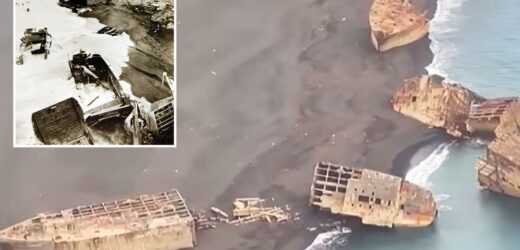WW2 ships sunk during the epic Battle of Iwo Jima have been raised from the bottom of the ocean after tremors from a Japanese volcano.
Satellite images show the battered remains of 24 transport vessels captured by the US Navy during the last days of the conflict in 1945.
The dramatic pictures were released by All Nippon News after the seabed began to rise due to activity from Mount Suribachi in the west of Iwo Jima island.
The sunken boats are now sitting on volcanic ash thanks to the seismic tremors.
During the war, the boats were moved to form a port to prepare for the invasion of US troops.
They formed a breakwater – which is usually a wall of stone or wood used to protect harbours from waves – to shield other boats which were unloading troops and weapons.
Iwo Jima was captured by the US because of its two airfields.
During the bloody battle, 216 Japanese soldiers were captured – while the rest of the country's 20,000 troops were killed.
Around 7,000 Americans lost their lives in the fighting.
The iconic photo known as Raising the Flag on Iwo Jima showing US Marines hoisting the American flag was taken at the peak of Mount Suribachi.
Suribachi, which is 554ft high, is reportedly one of the 10 most dangerous volcanoes in the country.
The island remains uninhabited except for the Japanese military, who have been stationed there since 1968.
Speaking of the activity, Setsuya Nakada, of the Volcano Research Promotion Centre, said: "The discoloured sea area has spread to surrounding areas, which indicates that the volcanic activity has not diminished yet.
"There is a possibility of a big eruption on Iwo Jima."
There have been at least 10 eruptions on Iwo Jima – dubbed Sulphur Island – which the most recent happening in 1982, data from Oregon State University shows.
In August, satellite images showed the moment underwater Fukutoku-Okanoba volcano, around three miles north of Iwo Jima, had erupted.
The eruption created a new island in the Ogasawara chain – which is a set of volcanic islands around 1000km south of Tokyo.
Earlier this month, a 6.1 magnitude earthquake rocked Tokyo, shaking buildings and bringing traffic to a standstill.
Japan sits on the so-called Ring of Fire – a long chain of volcanoes and fault lines around the edge of the Pacific Ocean.
We pay for your stories!
Do you have a story for The Sun news desk?
Email us at [email protected] or call 02077824104. You can WhatsApp us on 07423 720 250. We pay for videos too. Click here to upload yours
Click here to get The Sun newspaper delivered for FREE for the next six weeks.
Source: Read Full Article








